| Srl | Item |
| 1 |
ID:
137507
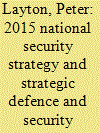

|
|
|
|
|
| Summary/Abstract |
In devising the 2015 National Security Strategy (NSS) and Strategic Defence and Security Review (SDSR), British decision-makers have a choice between trying to shape international affairs to be more favourable or instead planning to respond meaningfully to events that arise. The former grand strategic approach appears favoured however, the latter risk management approach remains the basis for work. That the two approaches are incompatible, distinctly dissimilar and would yield markedly different NSS and SDSR outcomes is generally overlooked. Moreover, opportunism, a third viable approach has been neglected. This article evaluates the three approaches, ascertains their principal advantages and weaknesses and outlines three alternative NSSs and SDSRs based on the different approaches.
|
|
|
|
|
|
|
|
|
|
|
|
|
|
|
|
| 2 |
ID:
119588
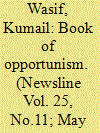

|
|
|
| 3 |
ID:
190736


|
|
|
|
|
| Summary/Abstract |
China has been consistently staking claim to the entire South China Sea (SCS) citing historical linkages. The consistent nature of these claims point towards the long-term nature of China’s interests, from nationalism and reclaiming lost territories to commercial and geostrategic interests. The onset of COVID-19 in Wuhan in November 2019 and its transformation into a global pandemic witnessed a shift in China’s foreign policy. The article analyses China’s evolving geopolitical interests and recent geopolitical opportunism during COVID-19, by way of unilateral state-level administrative actions, completion of military infrastructure development, conduct of military exercises, aggressive military actions, and wolf warrior diplomacy, to gain operational advantage by changing the status quo in its favour in the SCS in order to subordinate other claimants and dominate the region.
|
|
|
|
|
|
|
|
|
|
|
|
|
|
|
|
| 4 |
ID:
100137
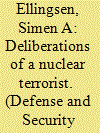

|
|
|
| 5 |
ID:
185010


|
|
|
|
|
| Summary/Abstract |
It is common for combatants to deliberately force civilians to flee their homes, resulting in incalculable loss for millions around the world. Existing accounts suggest combatants displace civilians whom they suspect are loyal to their opponents. And yet violence is also frequently motivated by local actors taking advantage of war to pursue private interests unrelated to wartime loyalties. However, little evidence exists of these dynamics with respect to displacement. Drawing on theories of opportunistic violence, I test an account in which surges in demand for land create incentives for elites to prey on peasants for their land. Combining new municipal and survey data from the Colombian armed conflict, I find evidence that the expansion of a land-intensive industry—African palm oil—precipitated opportunistic displacement by elites and paramilitary allies. The results demonstrate how elites can take advantage of war to engage in private accumulation and have implications for transitional justice policy.
|
|
|
|
|
|
|
|
|
|
|
|
|
|
|
|
| 6 |
ID:
086992
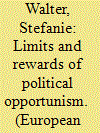

|
|
|
|
|
| Publication |
2009.
|
| Summary/Abstract |
Politicians are often assumed to be opportunistic. This article examines both whether there is a limit to this opportunism and whether voters reward policy makers for opportunistic behaviour. By looking at currency crisis situations, the article presents a graphic rational opportunistic political business cycle model in which incumbents face a tradeoff between their wish to signal competence and the economic constraints imposed by the crisis. It analyses how electoral incentives affect policy makers' management of currency crises and how this management in turn affects the subsequent election outcome. The empirical results of probit models with selection using a sample of 122 crises in 48 industrial and developing countries between 1983 and 2003 confirm the model's prediction that under certain circumstances some types of policy makers do indeed have incentives to deviate from optimal policy in the run-up to elections - and that voters reward this behaviour by re-electing policy makers who follow such strategies. However, there is a limit to the readiness to manipulate: when speculative pressure is too severe, incumbents no longer manipulate policy but implement the least painful policy option instead.
|
|
|
|
|
|
|
|
|
|
|
|
|
|
|
|
| 7 |
ID:
184713
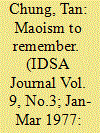

|
|
|
| 8 |
ID:
119453


|
|
|
|
|
| Publication |
2013.
|
| Summary/Abstract |
Qatar has become an Arab country with a high international profile and an ambitious foreign policy, particularly as a result of its role in the Arab Spring. It has cultivated a reputation as a political mediator and a key source of foreign aid. Following the Libyan uprising, Qatar demonstrated further political adaptability in leading regional action against the Gaddafi regime.
However, this foreign policy does not appear to be built on long-term planning, but rather seems centred on opportunism and promiscuity as Qatar engages with multiple, often clashing, actors and plays the role of political maverick in the Middle East. This article assesses the key components of Qatari foreign policy, as well as public diplomacy, highlighting the potential implications of the lack of a coherent foreign strategy for the country, both on the domestic and external fronts.
Domestically, Qatar faces increasing pressure for reform and the prospect of instability, both catalyzed by high centralization of decision-making with regard to Qatari policy. Externally, it risks overextending its network of political partners to involve potentially volatile actors, losing the credibility of its public diplomacy messages, and subsequently, international scepticism towards its foreign policy motives.
Those domestic and external factors highlight the limits of relying on pragmatism in Qatari foreign policy and the need for long-term strategy if Qatar is to maintain its leadership role in the Middle East.
|
|
|
|
|
|
|
|
|
|
|
|
|
|
|
|
| 9 |
ID:
115315
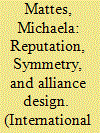

|
|
|
| 10 |
ID:
156109
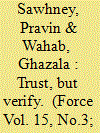

|
|
|